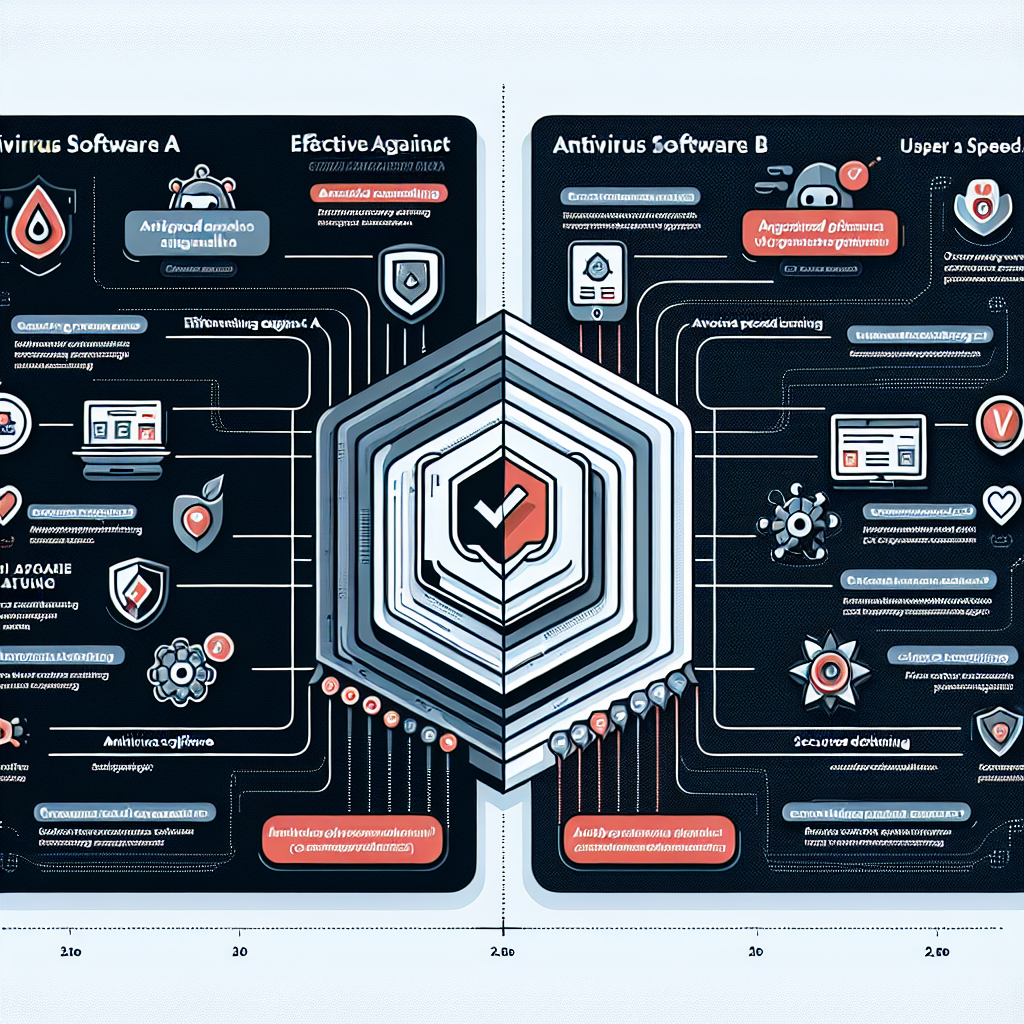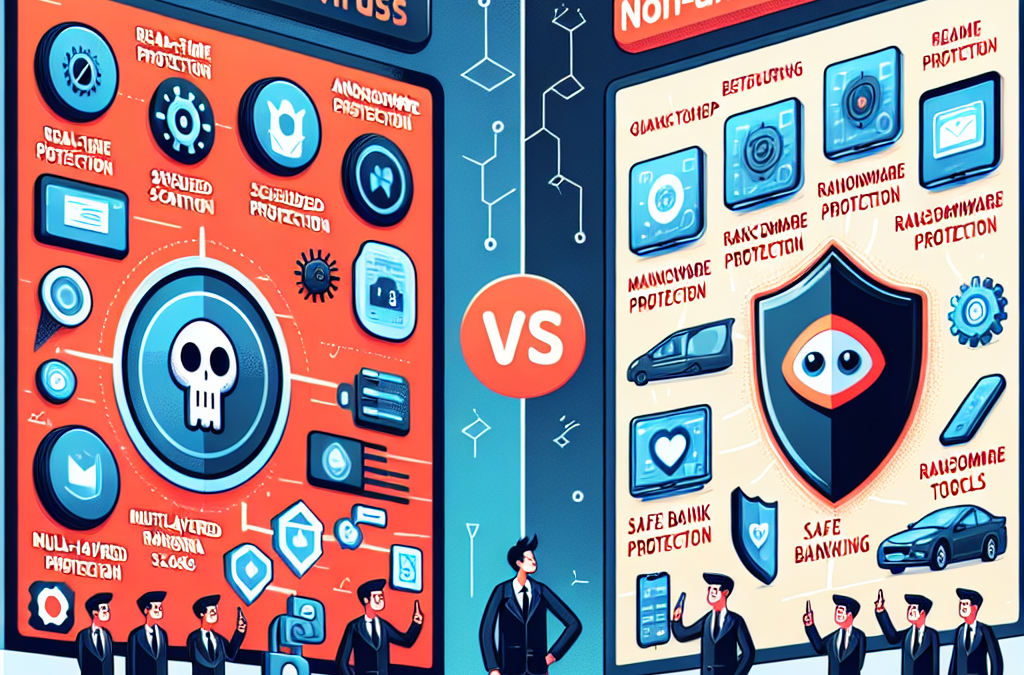Feature Comparison: Malwarebytes vs Bitdefender
When it comes to choosing the right antivirus software, the decision often boils down to comparing key features, performance, and overall value. Two prominent names in the cybersecurity industry are Malwarebytes and Bitdefender, each offering unique strengths that cater to different user needs. This comparison will delve into the core features of both products to help users make an informed choice.
Malwarebytes is widely recognized for its straightforward user interface and strong focus on malware protection. It offers a robust malware detection and removal engine that is particularly effective against adware and potentially unwanted programs (PUPs). One of the standout features of Malwarebytes is its real-time protection module, which actively blocks incoming threats before they can cause harm. Additionally, Malwarebytes provides a browser guard that helps protect against malicious websites, phishing attempts, and unwanted advertisements.
Transitioning to Bitdefender, this software is known for its comprehensive security suite that goes beyond basic malware protection. Bitdefender includes multi-layer ransomware protection, which uses behavioral threat detection to prevent infections. It also features an advanced firewall, webcam protection, and a password manager, which are not typically offered by Malwarebytes. Furthermore, Bitdefender’s Safe Files feature prevents unauthorized changes to important files, adding an extra layer of data protection.
Another critical aspect to consider is the impact of antivirus software on system performance. Malwarebytes is generally lighter on system resources compared to Bitdefender. Users with older computers or those who prioritize system speed might find Malwarebytes more appealing because of its minimalistic approach. However, for those who prefer a more robust security solution and do not mind a slight decrease in system speed, Bitdefender provides an extensive set of features that ensure comprehensive protection.
In terms of user experience, both Malwarebytes and Bitdefender offer clean and intuitive interfaces. However, Bitdefender’s dashboard is slightly more complex due to the additional features it offers. This complexity might be overwhelming for users who are not as tech-savvy or those who prefer a more streamlined interface. On the other hand, Malwarebytes’ simpler design is user-friendly, making it easy for even the most novice users to navigate and manage their antivirus settings.
Pricing is also a significant factor in the decision-making process. Malwarebytes offers a free version, which is great for users on a budget, but it lacks real-time protection. Its premium version, which includes additional features like ransomware protection and real-time defense, is competitively priced. Bitdefender, while generally more expensive, often includes additional tools and utilities that justify the higher cost. It also frequently offers discounts and bundled packages, which can provide excellent value for money.
Finally, customer support is crucial, especially when dealing with complex software issues. Both Malwarebytes and Bitdefender provide support through various channels including email, live chat, and phone support. However, Bitdefender tends to have a slight edge in customer service, offering more extensive support hours and a more comprehensive knowledge base.
In conclusion, the choice between Malwarebytes and Bitdefender should be guided by individual needs and preferences. If you are looking for a lightweight tool focused primarily on malware protection, Malwarebytes is an excellent choice. Conversely, if your priority is a more holistic security solution with additional features like firewall protection and file encryption, Bitdefender would be the better option. Both offer strong security capabilities, but understanding their differences in features, performance, and cost will help you choose the best antivirus solution for your specific requirements.
Performance Analysis: Malwarebytes vs Bitdefender
In the realm of cybersecurity, choosing the right antivirus software is crucial for protecting personal and professional data from malicious threats. Two prominent names that frequently come up in discussions about top-tier antivirus solutions are Malwarebytes and Bitdefender. Both have carved out strong reputations for their effectiveness, but how do they stack up against each other in terms of performance? This analysis delves into the various aspects of both Malwarebytes and Bitdefender to help users make an informed decision.
Starting with Malwarebytes, it is well-known for its user-friendly interface and quick installation process. Users often praise it for its simplicity and the minimal impact it has on system resources. Malwarebytes offers rapid scan capabilities that are efficient in detecting and removing malware. It is particularly effective against adware and potentially unwanted programs (PUPs), which are swiftly identified and eradicated by the software. However, when it comes to comprehensive protection, Malwarebytes sometimes requires integration with a primary antivirus to offer full-fledged defense mechanisms against all types of malware.
Transitioning to Bitdefender, this software is celebrated for its robust security features and excellent detection rates. Bitdefender uses advanced artificial intelligence and other innovative technologies to provide real-time protection against a wide range of threats, including viruses, worms, Trojans, ransomware, and zero-day exploits. One of the standout features of Bitdefender is its multi-layer ransomware protection, which not only prevents ransomware attacks but also protects your documents from being altered in any unauthorized way. Additionally, Bitdefender’s Autopilot mode adjusts security settings automatically based on your usage patterns and system configuration, which enhances overall protection without user intervention.
When comparing the impact on system performance, both Malwarebytes and Bitdefender perform admirably with slight differences. Malwarebytes is lighter on system resources, which makes it a suitable option for older machines or systems with limited processing power. On the other hand, Bitdefender, while slightly more resource-intensive, provides a range of performance optimization tools that can actually boost the overall efficiency of your system. These tools help manage battery life, startup items, and even detect slowdowns, ensuring that your device runs smoothly.
In terms of user experience, both antivirus programs offer clean and intuitive interfaces. Malwarebytes presents a straightforward dashboard that makes navigation easy for even the most novice users. Bitdefender’s interface is equally user-friendly but offers more customization options, which can be advantageous for more tech-savvy users who prefer to tailor their security settings.
Finally, considering the pricing and value for money, Malwarebytes offers a free version that provides basic protection, making it a good starting point for users on a budget. The premium version, which includes additional features like real-time protection and ransomware protection, is reasonably priced. Bitdefender also offers a range of options, from basic to total security packages, catering to different needs and budgets. Although Bitdefender might appear costlier, the additional features and comprehensive protection it offers justify the investment, especially for users seeking extensive security features.
In conclusion, both Malwarebytes and Bitdefender offer compelling advantages and some limitations. Your choice between the two will largely depend on what aspects of antivirus performance are most critical to you, whether it’s the lightness of the software on system resources, the depth of security features, or the cost-effectiveness of the solution. By carefully considering these factors, users can select an antivirus that best fits their security needs and usage patterns.
Pricing and Value: Malwarebytes vs Bitdefender

When considering the purchase of antivirus software, pricing and value are critical factors that can significantly influence a buyer’s decision. Malwarebytes and Bitdefender, both leaders in the cybersecurity arena, offer a range of products at different price points, catering to various user needs from basic protection to advanced security features. Understanding how these two brands stack up against each other in terms of pricing and the value they offer can help potential users make an informed choice.
Malwarebytes is known for its straightforward approach to pricing with a clear distinction between personal and business solutions. For personal use, Malwarebytes offers a free version which provides basic remedial action against infections. However, its real value is seen in the Premium version, which includes protection against malware, ransomware, and exploits in real-time. The cost for Malwarebytes Premium is relatively affordable, with a yearly subscription fee that covers up to five devices, making it an economical choice for families or individuals with multiple devices.
On the other hand, Bitdefender takes a slightly different approach by offering a tiered pricing model that includes several packages: Bitdefender Antivirus Plus, Bitdefender Internet Security, and Bitdefender Total Security. Each tier offers an incremental addition of features. Bitdefender Antivirus Plus, the entry-level option, provides basic antivirus protection plus multi-layer ransomware protection and online banking security. The Internet Security package adds features like parental controls and firewall protection, while the Total Security package rounds up the offering with system optimization tools and coverage for multiple operating systems, including Android and iOS.
Comparatively, Bitdefender might appear more expensive at first glance, especially at higher tiers, but it frequently offers discounts and promotions which can significantly reduce the cost. Additionally, the more comprehensive features available in the higher tiers can present a better value for users who require more robust security solutions, such as those with children or those managing multiple types of devices.
Both Malwarebytes and Bitdefender offer trial versions, allowing users to test the software before committing to a purchase. This is particularly useful for assessing whether the higher cost of Bitdefender’s advanced packages is justified in your specific context or if Malwarebytes’ simpler, more direct protection meets your needs adequately.
In terms of overall value, the decision between Malwarebytes and Bitdefender often comes down to the specific needs and usage scenarios of the user. Malwarebytes is potentially more suited for users who prefer a no-frills antivirus solution that provides essential protection without the complexity of additional features. Its lower cost also makes it accessible for users on a tight budget who still require effective malware protection.
Conversely, Bitdefender offers a comprehensive security suite that is more appropriate for users who seek extensive features beyond basic malware protection, such as parental controls and multi-platform support. Although it comes at a higher price point, the breadth of protection provided can offer greater peace of mind for users with diverse and demanding security needs.
Ultimately, both Malwarebytes and Bitdefender bring considerable value to the table, each excelling in different aspects of cybersecurity. The choice between them should be guided by individual requirements for protection, features, and budget, ensuring that the selected software aligns well with personal or business security needs.
User Experience: Malwarebytes vs Bitdefender
When it comes to choosing antivirus software, user experience stands as a critical factor that can significantly influence one’s decision. Malwarebytes and Bitdefender, both highly regarded in the cybersecurity arena, offer unique user experiences that cater to different preferences and needs. This comparison aims to shed light on how each software stands in terms of ease of use, interface design, and overall user satisfaction.
Starting with Malwarebytes, it is known for its straightforward and intuitive interface. Users often appreciate the simplicity that Malwarebytes brings to the table, making it particularly appealing for those who may not be as tech-savvy. The dashboard is clean and uncluttered, with clear indications of the system’s health and security status. This simplicity, however, does not compromise its effectiveness. Malwarebytes provides quick scans that are efficient and do not significantly slow down the computer. Moreover, for any issues detected, the software offers detailed explanations and recommended actions, which enhances the user’s understanding and control over the situation.
Transitioning to Bitdefender, this software is frequently praised for its comprehensive protection and a multitude of features, which cater to a wide range of users from casual home users to more demanding tech enthusiasts. The interface of Bitdefender is modern and user-friendly, but it packs more features compared to Malwarebytes, which might be overwhelming for some users at first. However, once familiar with the layout, users can appreciate the granularity it offers in terms of customization and control. Bitdefender’s Autopilot feature is a notable highlight, which intelligently recommends security actions in the context of the user’s system needs and usage patterns. This proactive approach not only enhances security but also improves the user experience by minimizing the need for manual inputs.
In terms of performance impact, both Malwarebytes and Bitdefender are designed to be efficient with system resources. However, Bitdefender takes a slight edge with its adaptive technologies that optimize performance according to the user’s system configuration and usage. This means that Bitdefender can offer robust protection without compromising the system’s performance, even during full scans, which is a significant advantage for users who multitask or use resource-intensive applications.
Customer support is another aspect of user experience where Bitdefender generally receives higher marks. With a range of support options including live chat, email, and extensive online resources, Bitdefender ensures that users can get help whenever needed. Malwarebytes, while offering solid support through forums and an online knowledge base, sometimes falls short in direct customer service compared to Bitdefender.
Finally, the overall satisfaction from users often reflects the balance between ease of use, features, and performance. Malwarebytes users frequently cite the software’s user-friendliness and effective malware removal as key advantages. On the other hand, Bitdefender users are typically very satisfied with the comprehensive protection and advanced features, although the initial learning curve can be a hurdle for some.
In conclusion, choosing between Malwarebytes and Bitdefender largely depends on what the user values most in their antivirus software. Those looking for a straightforward, easy-to-navigate interface might lean towards Malwarebytes, while users seeking extensive features with proactive security management might find Bitdefender more appealing. Both offer solid user experiences, but they cater to slightly different user needs and preferences.
Effectiveness Against New Threats: Malwarebytes vs Bitdefender
In the ever-evolving landscape of cybersecurity, staying ahead of new threats is a paramount concern for both individuals and organizations. Two prominent names in the industry, Malwarebytes and Bitdefender, offer solutions that promise to combat these emerging dangers, but their approaches and effectiveness can vary significantly.
Malwarebytes is widely recognized for its aggressive detection capabilities, particularly in dealing with zero-day exploits and ransomware. The software utilizes a signature-less technology that allows it to identify anomalies based on behavior rather than relying solely on a database of known malware signatures. This method is particularly effective against polymorphic viruses and malware that can alter their code to evade traditional detection methods. Moreover, Malwarebytes’ anti-exploit feature is designed to shield vulnerable programs from being exploited by newly discovered threats before they can cause harm.
On the other hand, Bitdefender takes a slightly different approach to tackling new threats. It incorporates advanced machine learning technologies coupled with a vast global security delivery infrastructure. This combination enables Bitdefender to analyze and identify suspicious patterns and behaviors across millions of systems worldwide, enhancing its ability to predict and neutralize threats before they proliferate. Furthermore, Bitdefender’s Photon technology optimizes the scanning process by adapting to the specifics of your system, which not only improves speed but also enhances real-time detection capabilities without compromising system performance.
Comparing the two, Malwarebytes’ strength lies in its specialized approach towards handling sophisticated malware attacks and zero-day threats through behavioral detection. This makes it a strong contender for users who might be at higher risk of such attacks, such as those frequently downloading new software or accessing potentially risky websites. The software’s focus on proactive exploitation prevention is a significant advantage in guarding against the unknown.
Conversely, Bitdefender offers a more holistic security solution. Its effectiveness against new threats is largely due to its comprehensive threat intelligence network that gathers data from millions of devices. The use of artificial intelligence and machine learning not only helps in early detection but also in maintaining a low false positive rate, which is crucial for ensuring that legitimate applications are not wrongfully blocked. This makes Bitdefender an ideal choice for environments where maintaining operational continuity and security without interruptions is critical.
Both Malwarebytes and Bitdefender provide robust protection against new and emerging threats, but their methodologies cater to slightly different needs. Malwarebytes excels in environments where the attack surface is dynamic and the threat of zero-day exploits is significant. Its ability to react quickly to unknown threats is a key asset. Bitdefender, with its global threat intelligence network and AI-driven analysis, offers a more rounded approach that is not only reactive but also predictive, making it suitable for users who need a balanced blend of performance and protection.
In conclusion, when deciding between Malwarebytes and Bitdefender, it is essential to consider the specific security needs of your environment. Whether your priority is aggressive detection and response to advanced malware or comprehensive coverage and predictive security, both solutions offer compelling features that address the challenges posed by new cybersecurity threats.


